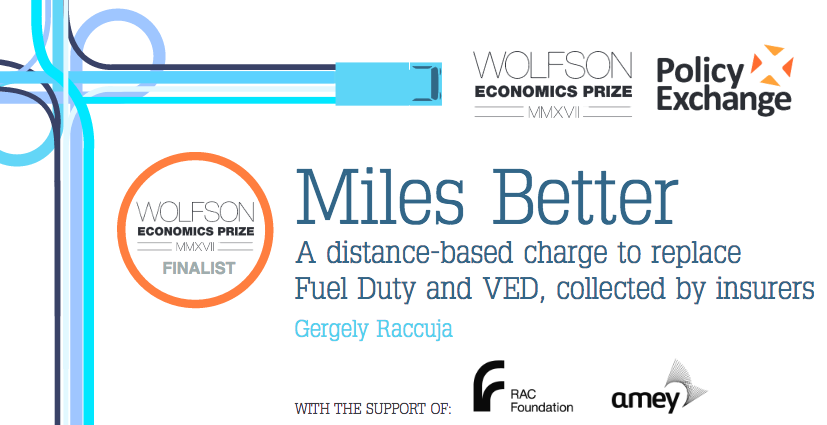Lord Wolfson offered a prize worth £250,00 for the best proposal in response to the question: ‘How can we pay for better, safer, more reliable roads in a way that is fair to road users and good for the economy and the environment’.
The winner was Gergely Raccuja, a recent UCL graduate, now a transport planner with Amey Consulting. His proposal has the merit of simplicity: replace Fuel Duty and Vehicle Excise Duty, receipts from which are declining as vehicles become more fuel-efficient, with a per-mile charge that would depend on a vehicle’s weight (reflecting the damage caused to the road) and emissions (damage to the environment). The charge would be collected by the insurance companies, the new charge being in effect a supplement to the insurance premium.
The impact of congestion caused by a vehicle is captured in a crude way by a distance-related charge. However, the opportunity to relate the charge to the level of congestion was not taken because of the perception that it would be unpopular and hence prevent the new charging scheme being adopted.
Some of the other finalists for the prize proposed schemes involving charging that reflected in part the contribution of vehicle users to congestion, but these were not favoured by the judges.
Assessment
It is very welcome that a new entrant to the transport planning profession was the prize winner, with a relatively simple proposal. But is it likely to be taken up? My sense is that implementation would not be seen as worth the effort and upheaval. Perhaps the main advantage is that electric vehicles would contribute to the costs of the road system, but for that purpose the proposal might be applied to EVs only, leaving Fuel Duty in place for vehicles with internal combustion engines.
The main shortcoming of the prize-winning proposal is the failure to address the problem of road traffic congestion and how it might be mitigated by charging. Public perceptions are important, of course, but I found it odd that there is no mention of London congestion charging, which has proved quite acceptable.
Any change to how we pay for roads should take the opportunity to ameliorate road traffic congestion, which is the biggest problem of the transport system. Arguably, the question set for the prize was misconceived, with its opening emphasis on ‘How can we pay for….’. It might have been better to ask ‘How can we achieve better, safer, more reliable roads….’

